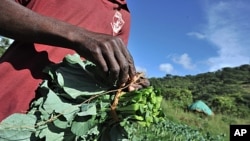The bacteria Listeria thrive in moist conditions, including on the surface of fresh spinach and other produce just after a rainfall or irrigation. Delaying the produce’s harvest for a day, until moisture evaporates, can reduce the risk of food-borne illness, new research shows.
Food poisoning with the pathogen Listeria monocytogenes can cause a range of reactions, from muscle aches, nausea and occasionally diarrhea in some patients to serious health threats in pregnant women, the elderly and people who are immune compromised, like those with HIV, according to the website FoodSafety.gov.
The bacterium is everywhere in the environment, but it tends to thrive in water. So, crops harvested shortly after rain or irrigation are likely to contain unsafe levels of disease-causing Listeria, said Martin Wiedmann, a Cornell University food safety professor.
"The water creates favorable conditions, which allow these bacteria – which are naturally there to begin with – to then multiply and be found and detected," Wiedmann said.
But "after one day, it drops back more or less to the baseline normal level that we find" in the environment, he added. "… Within a day, you are back to normal."
For that reason, researchers such as Wiedmann are encouraging farmers to wait 24 hours after a rainfall or irrigation before harvesting crops so a field has enough time to dry out.
Investigators discovered that Listeria levels were 25 times greater in crops like spinach harvested immediately after rain or irrigation.
The findings are published in the journal Applied and Environmental Microbiology.
Risks lurk elsewhere
Wiedmann said unsafe levels of Listeria can lurk in other settings, such as sandwich meat, especially when it’s not kept refrigerated to temperatures of minus 4 or 5 degrees Celsius or 25 degrees Fahrenheit.
"And so it’s important to have the tools in place to control this organism – everywhere from primary production to food processing plants to retail – to [help] consumers make smart decisions on what foods to eat and how to cook food," he emphasized.
Listeria poisoning is less common in developing countries where foods tend not to languish in refrigerators or iceboxes, another source of bacterial overgrowth, Wiedmann said.
He said the findings are intended to inform proposed U.S. Food and Drug regulations for "wait periods" after crop irrigation to give Listeria overgrowth time to die off.




